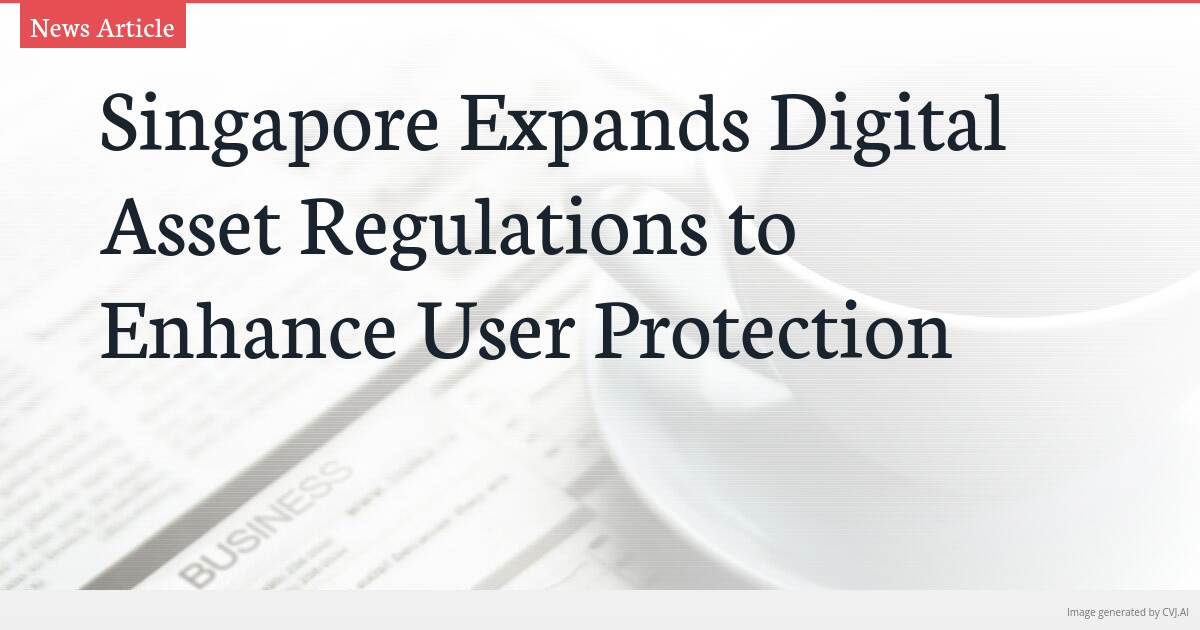This summary text is fully AI-generated and may therefore contain errors or be incomplete.
Singapore Expands Digital Asset Regulations
Singapore has recently announced significant amendments to its Payment Services Act (PS Act), broadening the scope of its digital asset regulations. The changes, set to take effect in stages from April 4, 2024, aim to enhance user protection and financial stability within the digital asset industry.
Regulatory Expansion
Under the revised regulations, the PS Act will now encompass the custody of tokens and a wider range of firms involved in fund transfers. Notably, service providers facilitating the transmission or exchange of tokens, even without coming into possession of the money or coins involved, will fall under the purview of the PS Act. Additionally, companies enabling cross-border transfers will be subject to the act, regardless of whether the funds are accepted or received in Singapore.
Enhanced Oversight
The Monetary Authority of Singapore (MAS) emphasized that these measures will enable the authority to impose requirements relating to anti-money laundering and countering the financing of terrorism. Furthermore, the amendments empower the MAS to enforce user protection and financial stability requirements on digital payment token (DPT) service providers.
Transitional Arrangements
Entities currently conducting activities falling under the expanded scope of the PS Act will be provided with transitional arrangements. They must notify the MAS within 30 days and submit a license application within six months from April 4, 2024, if they wish to continue their activities on a temporary basis while their applications are under review. Additionally, the license application must be accompanied by an attestation report completed by a qualified external auditor within nine months from April 4, 2024, detailing the entity’s business activities and compliance with anti-money laundering and countering the financing of terrorism requirements.
Compliance and Obligations
Entities failing to meet these requirements are obligated to cease their activities when the amendments come into effect. The new rules also include measures such as segregating customers’ assets in trust accounts, maintaining proper books and records, and ensuring effective systems and controls are in place to protect the integrity and security of customers’ assets.
Industry Impact
As Singapore competes with other jurisdictions like Hong Kong and Dubai to attract digital asset businesses, the city-state is focusing on creating a regulatory framework that fosters innovation while protecting investors and addressing the challenges associated with the crypto industry’s regulatory history.
Expert Insights
Angela Ang, senior policy adviser at blockchain intelligence firm TRM Labs, noted that some of these amendments have been in the works for years and “bring regulatory clarity to key parts of the crypto ecosystem.” This indicates a significant step towards establishing a more transparent and secure environment for digital asset activities in Singapore.
Conclusion
The amendments to the Payment Services Act mark a pivotal moment in Singapore’s efforts to position itself as an institutional hub for the digital asset industry. By prioritizing user protection and financial stability, while also fostering innovation, Singapore is taking proactive steps to shape a robust and trustworthy environment for digital asset businesses and investors.
📎 Read the original article on cryptobriefing.com


